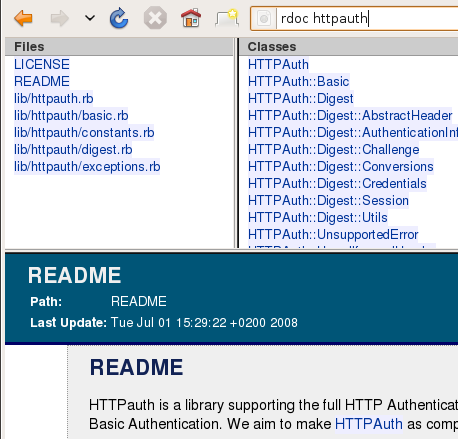Browse Ruby documentation with improved gem server
July 21, 2008
 I am currently using Netbeans as my Ruby IDE. The autocompletion feature
provides some RDoc snippets but does not always work.
I am currently using Netbeans as my Ruby IDE. The autocompletion feature
provides some RDoc snippets but does not always work.
The second option is to use some web resources like http://ruby-doc.org/ or directly use google. But this obviously does not work offline and possibly provides the wrong version of the documentation for those living on the bleading edge. For example, I use the "nightly" RSpec version installing it directly from the git hub.
So I stuck to the local gem server. Unfortunately it's start page is not so convenient, so I've patched the rubygems/server.rb. You can append following near the end of file:
# extended by Vladimir Dobriakov, http://www.innoq.com/blog/vd/
rdoc_proc = lambda do |req, resp|
gem_name = req.query['gem']
found_gems = Dir.glob("#{@gemdir}/doc/#{gem_name}*")
if found_gems.length == 1
new_path = File.basename(found_gems[0])
resp.status = 302
resp['Location'] = "/doc_root/#{new_path}/rdoc/index.html"
else
found_gems = Dir.glob("#{@gemdir}/doc/*") if found_gems.empty?
resp.body = '<ul>'
found_gems.each do |gem_name|
path = File.basename(gem_name)
url = "/doc_root/#{path}/rdoc/index.html"
resp.body << "<li style='margin-top: 1em'><a href='#{url}'>#{path}</a></li>"
end
resp.body << '</ul>'
resp['Content-Type'] = 'text/html'
end
end
@server.mount('/rdoc', WEBrick::HTTPServlet::ProcHandler.new(rdoc_proc))
just before
trap("INT") { @server.shutdown; exit! }
trap("TERM") { @server.shutdown; exit! }
@server.start
end
end
Now the new code is tied to urls like http://localhost:3333/rdoc?gem=active providing either a list of the links to the documentation for the gems, which names start with 'active' or directly jumping to the rdoc of the gem in case there is only one search hit.
In my del.icio.us Plugin for the Firefox I connected
http://localhost:3333/rdoc?gem=%s to rdoc keyword. So now I can simply
type in something like rdoc httpauth
UPDATE. One additional trick. Run
# please adjust paths accordingly
# use for example 'locate yaml.rb' and 'gem environment'
# for identifying directories
# install ruby sources
cd /usr/src
sudo apt-get source ruby
rdoc -o /usr/lib/ruby/gems/1.8/doc/core/rdoc /usr/lib/ruby/1.8 ruby1.8-1.8.7.72
to generate the rdoc for the core ruby libraries (not gems). The -o parameter specifies the output directory. Two directory names, that follow, specify the ruby- and the C sources respectively.
And how do you browse the ruby documentation?
